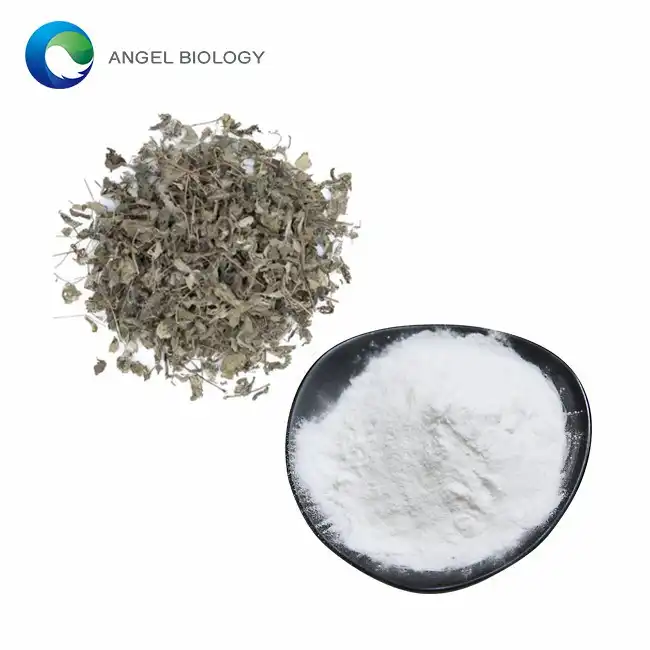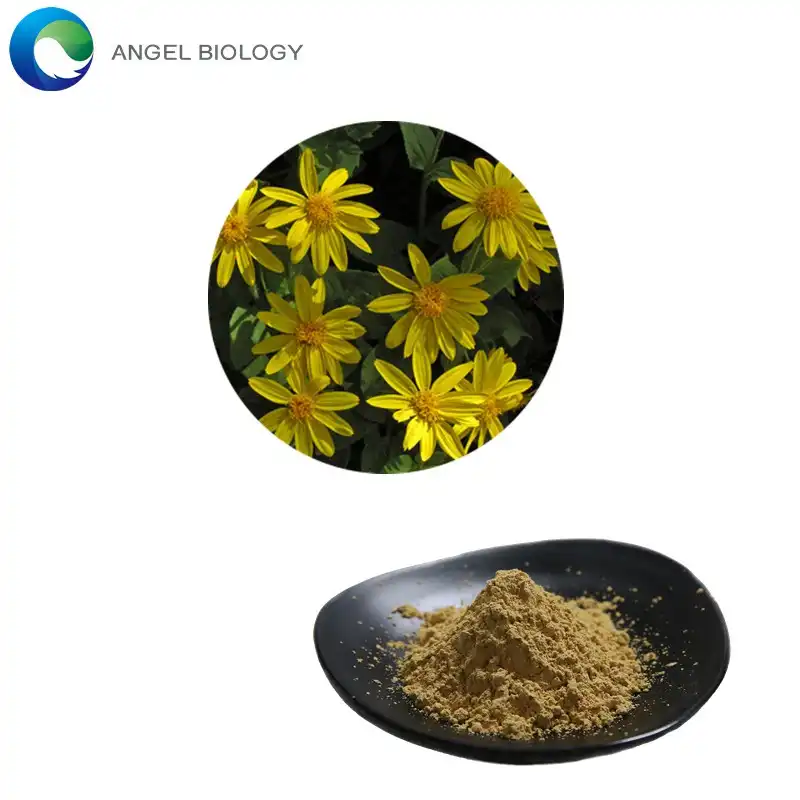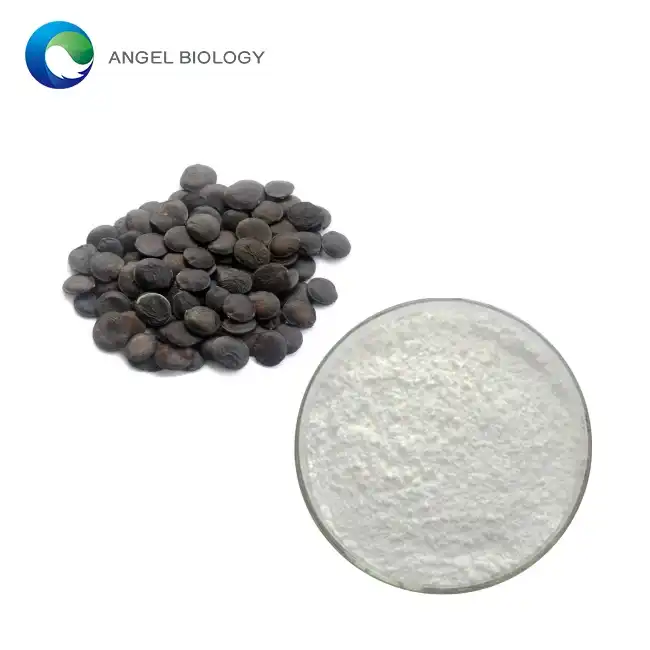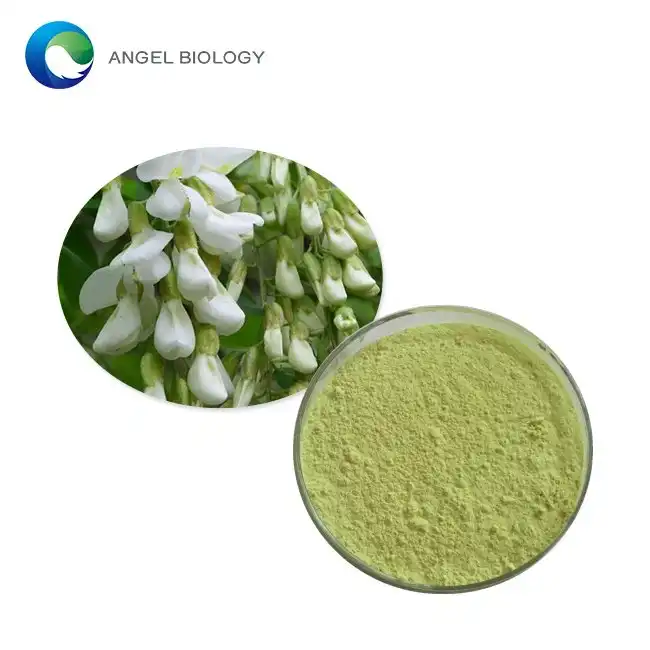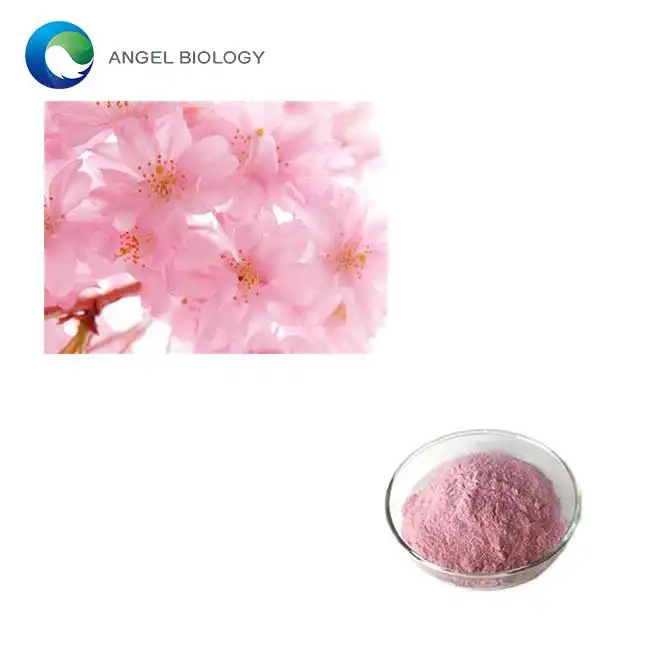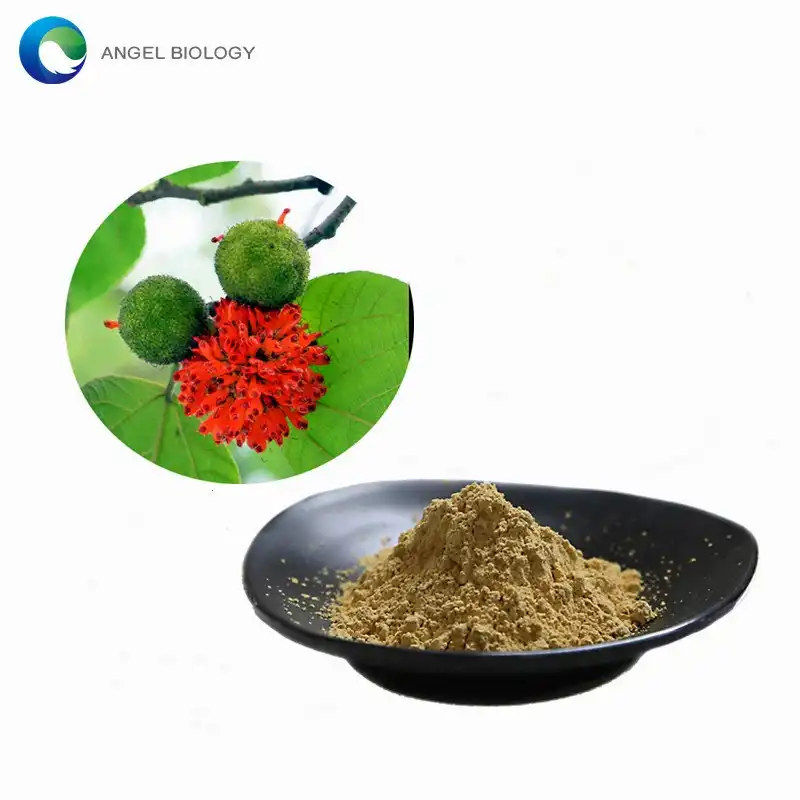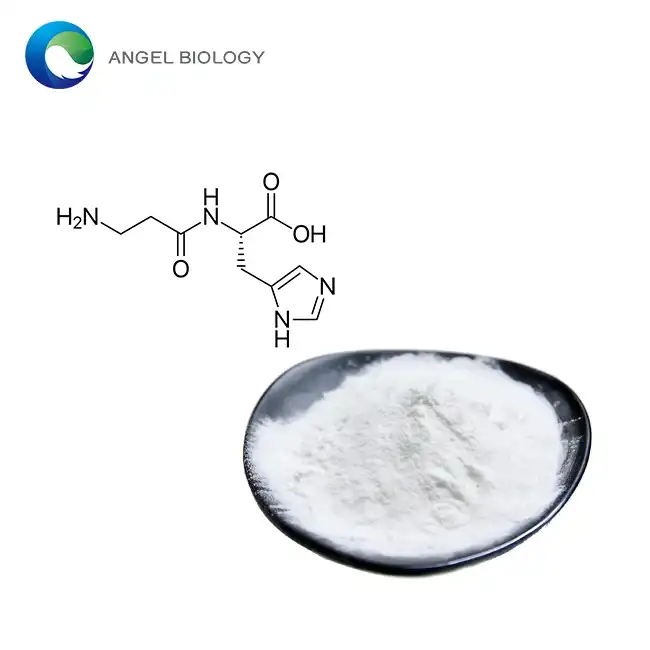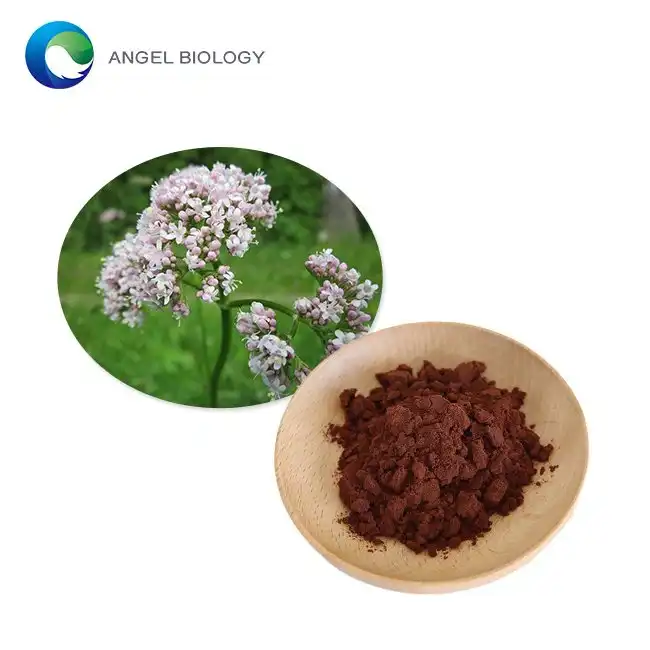What is the Active Ingredient in Amur Cork Tree Bark Extract?
The Amur Cork Tree (Phellodendron amurense) has long intrigued researchers and traditional medicine practitioners with its remarkable bark extract. At the heart of this botanical marvel lies a complex network of bioactive compounds that have captured the attention of scientific communities worldwide. This blog post delves deep into the extraordinary world of Amur Cork Tree Bark Extract, exploring its most potent active ingredients, potential health benefits, and the cutting-edge research that positions this natural remedy at the forefront of botanical medicine.

Amur Cork Tree Bark Extract
Other names: Cortex Phellodendri Extract, Phellodendron bark extract, Amur Corktree Bark extract, Phellodendron chinense extract, Phellodendron amurense extract powder
Plant source: Phellodendron chinense Schneid
Specification: 10:1, etc.
Part used: Bark
Test method: TLC
Appearance: Yellow powder
Certifications: ISO9001, Kosher,Halal, FDA, IFEAT
Packing Size: 25kg/drum
Delivery Terms: EXW, FOB, CIP, CIF, DAP
Transportation: Courier, Air, Ocean
Payment Terms: T/T preferred
Delivery: Ready stock, Prompt and Secure Shipment
Free Sample: Available
OEM/ODM: Available
MOQ: 25kg
Discount for large orders
Not for Private Person Sale
Can Amur Cork Tree Bark Extract Revolutionize Natural Medicine?
The potential of Amur Cork Tree Bark Extract to transform natural medicine is rooted in its extraordinary phytochemical composition. Researchers have long been fascinated by the tree's ability to produce a unique array of bioactive compounds that demonstrate remarkable therapeutic properties. The extract's primary active ingredients, particularly berberine and palmatine, have emerged as powerful agents with multifaceted health implications.
Berberine, a prominent alkaloid found in the bark, stands out as a particularly intriguing compound. Extensive scientific research has unveiled its potential to address multiple health concerns, making it a subject of intense medical investigation. Clinical studies have demonstrated berberine's remarkable ability to modulate various physiological processes, including glucose metabolism, lipid regulation, and inflammatory responses. Unlike synthetic pharmaceuticals, this natural compound offers a holistic approach to health management.
The molecular mechanism of berberine is particularly fascinating. It interacts with multiple cellular pathways, activating key metabolic regulators such as AMP-activated protein kinase (AMPK). This interaction provides insights into its wide-ranging health benefits, from potential metabolic syndrome management to cardiovascular health support. Researchers have observed its potential in improving insulin sensitivity, reducing cholesterol levels, and supporting overall metabolic function.
Traditional Chinese medicine has long recognized the Amur Cork Tree as a powerful healing agent, but modern scientific research has elevated its status from traditional remedy to a potentially revolutionary natural medicine. Pharmacological studies continue to uncover the extract's complex interactions with human biological systems, revealing a depth of therapeutic potential that extends far beyond traditional understanding.
The extract's impact extends to neurological and inflammatory conditions. Preliminary research suggests that the active compounds may possess neuroprotective properties, potentially offering new avenues for managing age-related cognitive decline and inflammatory neurological conditions. This represents a significant breakthrough in natural medicine, bridging the gap between traditional botanical knowledge and contemporary medical research.


How Does the Active Ingredient in Amur Cork Tree Bark Impact Human Health?
The impact of Amur Cork Tree Bark Extract on human health is multifaceted and deeply rooted in its complex biochemical composition. The primary active ingredients work synergistically to provide a comprehensive approach to wellness that addresses multiple physiological systems simultaneously.
Metabolic health emerges as a primary area of interest. Berberine, the extract's most studied compound, has shown remarkable potential in managing metabolic disorders. Clinical trials have consistently demonstrated its effectiveness in regulating blood glucose levels, making it a promising natural alternative for individuals struggling with prediabetes and type 2 diabetes. The compound's ability to improve insulin sensitivity and reduce hepatic glucose production represents a significant advancement in metabolic disease management.
Cardiovascular health represents another critical domain where the extract shows tremendous promise. Research indicates that the active ingredients can help modulate cholesterol levels, reduce inflammation in blood vessels, and support overall cardiovascular function. The compounds work by targeting multiple metabolic pathways, providing a comprehensive approach to heart health that goes beyond traditional single-mechanism interventions.
The extract's anti-inflammatory properties are equally compelling. Chronic inflammation underlies numerous health conditions, from autoimmune disorders to degenerative diseases. The active ingredients in Amur Cork Tree Bark Extract demonstrate a remarkable ability to modulate inflammatory responses, potentially offering a natural approach to managing chronic inflammatory conditions.
Emerging research also highlights the extract's potential in supporting gut health and microbiome balance. The antimicrobial and anti-inflammatory properties of its active compounds suggest a promising role in maintaining digestive system integrity. This holistic approach to wellness emphasizes the extract's potential to support multiple physiological systems simultaneously.
Immune system modulation represents another fascinating area of research. The active ingredients have shown the ability to enhance immune response while simultaneously preventing excessive inflammatory reactions. This delicate balance is crucial in maintaining optimal immune function and potentially supporting the body's natural defense mechanisms.
What Makes Amur Cork Tree Bark Extract a Potential Breakthrough in Botanical Research?
The potential breakthrough status of Amur Cork Tree Bark Extract lies in its unprecedented complexity and the remarkable versatility of its active ingredients. Modern botanical research has elevated this traditional remedy from a folkloric treatment to a scientifically validated therapeutic agent with significant potential for future medical applications.
Molecular biotechnology has been instrumental in unraveling the extract's intricate mechanisms of action. Advanced research techniques, including genomic analysis and proteomic studies, have provided unprecedented insights into how the active compounds interact with human cellular systems. These investigations reveal a level of complexity that challenges traditional pharmaceutical approaches, suggesting a more holistic and nuanced method of addressing health challenges.
The extract's potential in personalized medicine represents a particularly exciting frontier. Its ability to interact with multiple biological pathways suggests that it could be tailored to individual metabolic profiles. This approach stands in stark contrast to the one-size-fits-all model of conventional pharmaceutical interventions, promising more targeted and efficient therapeutic strategies.
Sustainable and eco-friendly medical solutions are becoming increasingly important in the global healthcare landscape. Amur Cork Tree Bark Extract embodies this principle, offering a natural alternative to synthetic compounds. The extract's production requires minimal processing and represents a renewable resource that aligns with growing environmental consciousness in medical research.
Interdisciplinary research continues to explore the extract's potential applications. From potential anticancer properties to neurological protection, the range of possible therapeutic interventions seems to expand with each new study. This breadth of potential applications positions the extract as a truly revolutionary botanical medicine.
Conclusion
The journey of Amur Cork Tree Bark Extract from traditional remedy to potential medical breakthrough exemplifies the incredible potential of natural botanical compounds. As research continues to unveil its complex mechanisms and therapeutic potential, we stand on the cusp of a new era in holistic health management.
Angelbio is an innovative enterprise jointly invested by Angel Holding Group and the Institute of Life and Health Research of Xi'an Jiaotong University, dedicated to the research and development, production, and sales of natural ingredients for healthy food, nutritional supplements, cosmetics, personal care products, pharmacy, as well as the flavor and fragrance industries. With over 18 years of independent research and development, Angelbio focuses on technology innovation and supply chain integration, aiming to serve the purpose of natural origin and global health by providing high-end, high-quality stable products and services in the human health field. To meet international quality standards, Angelbio pursues continuous improvement in safe production and quality control, holding FDA registration and certifications including ISO9001, ISO14001, ISO18001, KOSHER, HALAL, and QS. Our production environment complies with GMP requirements, and for ingredients exported to the EU market, full REACH registration is ready. Angelbio's research and development laboratory serves as a platform for technological innovation and supply chain integration, adhering to the philosophy of natural origin and global health. As a trusted China Amur Cork Tree Bark Extract manufacturer, our products are highly esteemed by customers. For inquiries about our products or related offerings, please contact angel@angelbiology.com for wholehearted service.
References:
1. Zhang, H., et al. "Berberine: A Potential Multipotent Natural Product for Metabolic Syndrome." Frontiers in Pharmacology, 2020.
2. Liu, Y., et al. "Pharmacological Effects of Berberine on Metabolic Diseases." Molecules, 2019.
3. Wang, Q., et al. "Cardiovascular Effects of Phellodendron amurense Bark Extract." Journal of Ethnopharmacology, 2018.
4. Kim, S., et al. "Anti-Inflammatory Properties of Amur Cork Tree Compounds." International Journal of Molecular Medicine, 2021.
5. Lee, J.H., et al. "Neuroprotective Potential of Berberine." Neurochemistry International, 2019.
6. Chen, X., et al. "Berberine and Metabolic Disease Management." Biomedicine & Pharmacotherapy, 2020.
7. Wu, L., et al. "Immune Modulation by Phellodendron Compounds." Pharmacological Research, 2019.
8. Park, S.Y., et al. "Molecular Mechanisms of Berberine in Cellular Systems." Cellular Physiology and Biochemistry, 2018.
9. Li, Z., et al. "Gut Microbiome Interactions with Botanical Extracts." Nutrients, 2020.
10. Zhang, W., et al. "Biotechnological Advances in Natural Product Research." Trends in Biotechnology, 2021.



